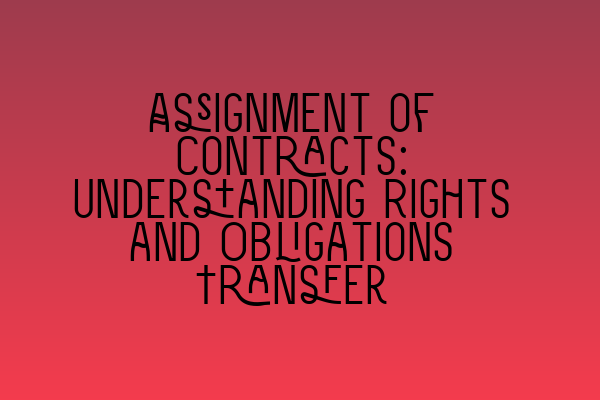Assignment of Contracts: Understanding Rights and Obligations Transfer
Welcome to SQE Contract Law! In this blog post, we will delve into the fascinating world of contract assignment and explore how rights and obligations are transferred between parties. Whether you are a solicitor, a law student, or simply interested in contract law, this article will provide valuable insights and knowledge to enhance your understanding. So, let’s dive in!
Before we proceed, it’s essential to highlight the importance of contract assignment. In a nutshell, contract assignment allows one party (the assignor) to transfer their rights and obligations under a contract to another party (the assignee). This transfer of rights and obligations can occur for various reasons, such as the need to delegate responsibilities, the desire to transfer ownership, or the need to fulfill contractual obligations in a more efficient manner.
To begin our journey into the intricacies of contract assignment, let’s first understand the key parties involved. In any assignment scenario, we have the assignor, the assignee, and the obligor. The assignor is the party who transfers their rights and obligations, while the assignee is the party who receives these rights and obligations. The obligor, on the other hand, is the party with whom the assignee will now have to interact to fulfill the contractual duties.
Now that we have a clear understanding of the parties involved, let’s explore the legal framework governing contract assignment. In the United Kingdom, contract assignment is primarily governed by the Law of Property Act 1925. This legislation provides the legal basis for the transfer of various rights and obligations, including contractual rights and benefits.
It’s crucial to note that not all contracts are assignable. Some contracts explicitly prohibit assignment, while others require the consent of all parties involved. Therefore, it’s essential to thoroughly review the terms and conditions of the contract in question before attempting to assign it. The law surrounding the assignment of contracts can be complex, and seeking professional legal advice may be necessary to ensure compliance and protect your rights.
Now that we have covered the basics, let’s explore the benefits of contract assignment. There are several advantages to consider:
1. Delegation of Duties: Contract assignment allows parties to delegate specific responsibilities to more capable or specialized individuals or businesses. This can lead to increased efficiency and improved performance, benefiting all parties involved.
2. Financial Flexibility: Contract assignment can provide financial flexibility, allowing parties to monetize their contractual rights. Assignors may receive payment or consideration for the transfer of these rights, providing immediate financial benefits.
3. Risk Mitigation: By assigning a contract, the assignor can transfer the associated risks and liabilities to the assignee. This can be particularly beneficial in cases where the assignor wishes to limit their exposure to potential legal disputes or financial obligations.
4. Strategic Partnerships: Contract assignment can facilitate strategic partnerships between businesses, enabling them to leverage each other’s strengths and expertise. This can lead to mutually beneficial collaborations and enhanced business growth.
It’s important to note that contract assignment does not absolve the assignor of their obligations entirely. Unless the contract explicitly releases the assignor from liability, they may remain partially or wholly liable for the performance or non-performance of contractual obligations. As such, it’s crucial for assignors to carefully consider the terms and conditions of the assignment to protect their interests.
In conclusion, contract assignment is a valuable tool that allows parties to transfer rights and obligations under a contract. Understanding the legal framework and potential benefits is crucial before proceeding with any assignment. If you are considering contract assignment or have questions regarding the process, it is advisable to seek professional legal advice to ensure compliance and protect your rights.
Thank you for joining us on this journey to explore the intricacies of contract assignment. Continue your legal education by checking out our related articles:
1. Unveiling Real-Life Case Studies: Insights into Legal Practice and Decision-Making
2. Exploring Solicitor Salaries in the UK: Average Earnings and Factors Affecting Income
3. Mastering Client Relationship Management: Skills for Solicitors to Enhance Trust and Loyalty
4. Pursuing a Law School Education in the UK: Choosing the Right Path for Your Future
5. Securing Training Contracts: A Roadmap to Becoming a Solicitor
We hope you found this article informative and engaging. Should you have any further questions or require legal assistance, do not hesitate to reach out to SQE Contract Law.
